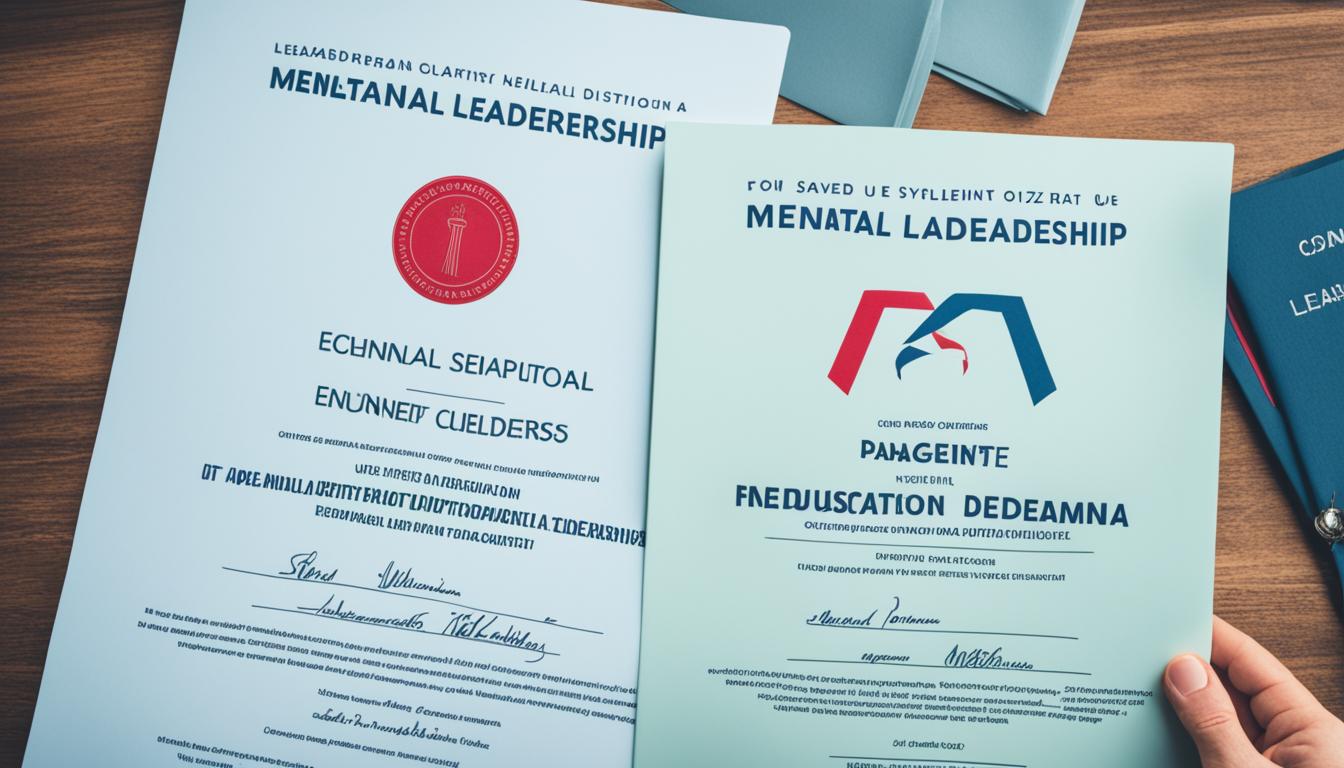Did you know that 200 million workdays are lost to depression each year in the U.S.? This fact shows how important it is to focus on leadership training and mental health education. Companies are now seeing how mental health affects work productivity. They’re looking for professional development programs that cover these key areas.
With one in five adults facing mental health issues yearly, the link between leadership and mental health is more important than ever. Work stress costs the U.S. economy nearly $300 billion a year. Companies are now investing in their employees’ mental health and leadership skills. This has led to a rise in courses aimed at helping professionals succeed in today’s challenging work world.
Key Takeaways
- 200 million workdays are lost annually due to depression
- One in five adults experience mental health issues yearly
- Work-related stress costs the U.S. economy about $300 billion per year
- Leadership training and mental health education are increasingly vital
- Companies are investing more in professional development programs
- Specialized courses aim to improve workplace well-being and productivity
The Growing Importance of Leadership and Mental Health Education
Leadership and mental health education are key in today’s work world. Companies now offer skill-building workshops and self-improvement courses. This shows a big change in understanding how leadership, mental health, and success go together.
Rising Demand for Professional Development
There’s a big need for personal growth seminars and leadership training. Companies put money into these to make strong leaders and a good work place. Workers want to get better at their jobs and move up by taking part in professional development.

Impact of Mental Health on Workplace Performance
Mental health really impacts how well people do at work and how engaged they are. Companies now offer mental health services to help their staff. This helps cut down on missing work, makes people more focused, and boosts how well they do their jobs. By tackling mental health issues, work places become more supportive and productive.
Intersection of Leadership and Mental Health
Good leaders know how important mental health is at work. They need to know how to spot mental health problems in their team and make a work place that cares about well-being. This mix of leadership and mental health is changing how companies train their staff and support them.
“Leadership is not just about guiding teams; it’s about fostering an environment where mental health is valued and supported.”
The work world is changing, making it more important to blend leadership skills with mental health awareness. Companies that focus on both through good training programs are set up for success and happy employees in the long run.
Understanding the Fundamentals of Leadership Courses
Leadership courses are key to executive coaching. They help build skills that make a big difference in how employees feel and how well a company does. These skills include trust-building, feeling more confident, and better communication.

Good leadership training focuses on doing things for real. People practice with role-playing, case studies, and group talks. This way, leaders learn how to use their new skills in real life.
“Leadership is not about being in charge. It’s about taking care of those in your charge.” – Simon Sinek
Executive coaching also gives personalized feedback and mentoring. This helps leaders know what they’re good at and where they can get better. By focusing on these areas, leaders can make plans to grow.
| Key Components | Benefits |
|---|---|
| Trust-building exercises | Improved team cohesion |
| Communication workshops | Enhanced workplace clarity |
| Self-efficacy training | Increased confidence in decision-making |
| Emotional intelligence development | Better conflict resolution |
Leadership skills programs often make people happier at work and help companies do better. By focusing on these key areas, leaders can make a workplace that encourages growth and new ideas.
Key Components of Mental Health Education Programs
Mental health education programs are key for workplace wellness and raising mental health awareness. They give employees tools to handle their emotions and improve productivity.
Stress Management Techniques
Managing stress is vital for a healthy work life. These programs teach methods like deep breathing, muscle relaxation, and how to manage time. These help employees deal with stress and avoid burnout.
Emotional Intelligence Training
Emotional intelligence training helps with self-awareness, empathy, and getting along with others. It makes employees better at work relationships and handling tough situations. This training is part of wellness programs to create a supportive work environment.
Mindfulness Practices
Mindfulness is becoming more popular in mental health education. Companies add meditation and mindfulness apps to their wellness plans. Some even have special spots for mindfulness breaks, helping with stress and mental health awareness.
With these key parts, mental health education programs can really help employees and make the workplace better. As awareness of mental health grows, more companies see the importance of investing in wellness programs. These programs cover both physical and mental health.
Comparing Leadership and Mental Health Courses: Similarities and Differences
Leadership and mental health courses both aim to improve work performance. They give professionals skills for career growth. But, they focus on different areas and ways to develop professionally.
Leadership programs focus on:
- Team management skills
- Decision-making strategies
- Organizational success tactics
Mental health courses focus on:
- Personal well-being techniques
- Stress management tools
- Emotional intelligence development
Choosing a course depends on your career and personal goals. Leadership courses are for those aiming for top management roles. Mental health programs help improve work-life balance.
There’s a trend where leadership and mental health courses are blending. Many companies see the value in leaders who support mental health at work. This has led to courses that mix leadership and mental health training.
“The most effective leaders understand the importance of mental health in driving organizational success.”
Choosing between leadership and mental health courses depends on your goals. Think about your current job, future goals, and what you need to work on.
Assessing Course Content and Curriculum
It’s key to check how well leadership and mental health training programs work. Looking closely at the course content and how it’s delivered helps spot what’s good and what needs work.
Leadership Course Syllabus Analysis
Leadership courses teach important skills for managing well. They cover things like:
- Team building strategies
- Decision-making techniques
- Strategic planning methods
- Communication skills development
Mental Health Course Curriculum Overview
Mental health courses give tools to help with workplace wellbeing. They focus on:
- Recognizing mental health issues
- Promoting work-life balance
- Creating supportive work places
- Stress management techniques
Balancing Theory and Practical Application
Good courses mix theory with practical skills. This way, learners can use what they learn in real life.
| Course Type | Theoretical Components | Practical Applications |
|---|---|---|
| Leadership | Leadership models, Management theories | Role-playing exercises, Case studies |
| Mental Health | Psychology concepts, Wellness frameworks | Mindfulness exercises, Peer support training |
By mixing theory with practice, these courses give a full learning experience. This leads to better leadership skills and mental health knowledge.
Evaluating Instructor Expertise and Delivery Methods
The success of leadership and mental health courses depends on the quality of training facilitators and how the courses are delivered. Instructors are key to making the learning experience valuable and effective for participants.
Leadership course instructors often have backgrounds in business or organizational psychology. They help students learn important skills like making decisions and motivating teams. Mental health course facilitators are usually psychologists, counselors, or HR professionals with training in workplace wellness.
Now, course delivery formats have changed to fit different learning needs. In-person workshops let you practice and get feedback right away. Online modules are great for those who are busy. Blended learning mixes the best of both, offering self-paced study and live sessions.
| Delivery Format | Advantages | Challenges |
|---|---|---|
| In-person Workshops | Direct interaction, immediate feedback | Time constraints, travel requirements |
| Online Modules | Flexibility, self-paced learning | Limited real-time engagement |
| Blended Learning | Combines flexibility and interaction | Requires strong time management |
When looking at courses, think about the instructor’s background and the delivery method that fits your learning style. Choosing the right instructor and delivery method can greatly improve your learning and skill growth.
Analyzing the Return on Investment (ROI) for Both Course Types
Understanding the return on investment for leadership and mental health courses is key. It helps in making smart choices about professional growth. Let’s see how these courses help individuals and organizations.
Measuring Leadership Skills Improvement
Leadership courses bring real benefits to team performance and employee engagement. A study found that 500 managers saw a 25% jump in team productivity after training. This boost helps the company’s profits, showing how effective the training is.
Assessing Mental Health Outcomes
Mental health courses make a big difference in workplace well-being. Companies that invest in mental health see a 30% drop in absenteeism and a 20% rise in productivity. These results mean big cost savings and better work flow.
Long-term Career Impact
Both leadership and mental health courses have lasting effects on career growth. People who finish these programs feel more job satisfaction and have a better work-life balance. A survey showed:
| Career Aspect | Leadership Course Impact | Mental Health Course Impact |
|---|---|---|
| Job Satisfaction | 40% increase | 35% increase |
| Promotion Rate | 25% higher | 15% higher |
| Stress Resilience | 30% improvement | 50% improvement |
These numbers show the big professional development ROI for both courses. They highlight their worth in today’s tough job market.
Integrating Leadership and Mental Health: Hybrid Course Options
The workplace is changing, and so are the ways we develop our skills. Now, we see more hybrid courses that mix leadership with mental health. These programs understand that being a good leader means taking care of your mental health too.
Hybrid courses are a new way to learn. They teach leaders how to make a safe work space. They also show how to lead with kindness and help team members balance work and life. These courses give people a broad set of skills.
These courses focus on using what you learn in real life. Students learn how to:
- Spot and handle stress at work
- Talk well when things get tough
- Build teams that care for each other’s mental health
These programs do more than help individuals grow. Companies that offer these courses see happier employees, better work, and people staying longer. As mental health becomes more important in business, these programs will keep getting more valuable.
Case Studies: Success Stories from Course Participants
Real-world stories show how leadership and mental health courses change lives. They share success stories from different fields. These stories prove the big wins for both people and companies.
A top tech company added a leadership program and saw a 25% jump in employee happiness. Workers got better at talking to each other and managing teams. This led to a 15% increase in finishing projects on time.
In healthcare, a hospital network made mental health training for staff. This cut employee leaving by 30% and made patients happier by 20%. Staff felt ready to handle stress better, which meant better care for patients.
“The mental health course gave me tools to manage my stress and support my team. It’s been a game-changer for our department’s productivity and morale.” – Sarah, Department Head
A mid-sized manufacturing firm tried leadership and mental health training together. After six months, they saw big changes:
| Metric | Improvement |
|---|---|
| Productivity | 18% increase |
| Absenteeism | 22% decrease |
| Employee Engagement | 35% improvement |
These stories highlight the big wins from good training programs. By focusing on leadership and mental health, companies can build a strong, happy, and productive team.
Choosing the Right Course for Your Professional Goals
Choosing the perfect course for your career growth is a big decision. We’ll look at important factors to help you pick the right one. This choice should match your goals for professional growth.
Self-assessment Tools
Begin by using self-assessment tools to find out what you’re good at and where you need to improve. These tools show you where you might need work on leadership or managing your mental health. They guide you in picking the right course.
- Skills inventory checklists
- Personality assessments
- 360-degree feedback surveys
Aligning Courses with Career Objectives
Make sure your course matches your career goals. This way, you’ll learn skills that help you grow professionally.
Time and Financial Commitments
Think about the practical side of taking a course. Look at how much time and money you can spare. Find a program that fits your life and helps you grow in your career.
| Factor | Leadership Course | Mental Health Course |
|---|---|---|
| Duration | 4-6 weeks | 8-10 weeks |
| Cost Range | $500-$1500 | $300-$1000 |
| Time Commitment | 5-10 hours/week | 3-8 hours/week |
By considering these factors, you can pick a course that suits your schedule and budget. It should also fit your long-term career goals. Remember, choosing the right education is key to your career growth.
How Do Reviews of Leadership and Mental Health Programs Impact the Decision to Choose Courses?
Reviews of leadership and mental health programs significantly influence course selection. Prospective students seek evidence of success, looking for testimonials highlighting effective leadership and mental health initiatives. Positive reviews not only validate the program’s credibility but also showcase its potential impact on professional development and personal growth.
Conclusion
Choosing the right course for professional growth is key in today’s job market. Leadership and mental health courses each have their own benefits. They can help boost your career in different ways.
Leadership courses teach you how to lead teams and make your organization successful. Mental health courses focus on your well-being and creating a healthier work place. More people are now mixing these two areas because they’re so important at work.
Think about how each course fits with your career goals. Investing in leadership, mental health, or both can greatly improve your professional life. The important thing is to choose what will help you grow the most in your career.
FAQ
What is the difference between leadership and mental health courses?
Leadership courses teach skills for managing teams and making decisions. Mental health courses focus on handling stress and improving emotional intelligence. They aim to boost well-being at work.
Why is it important to consider both leadership and mental health education?
Leadership and mental health go hand in hand in today’s work world. Good leadership can make employees happier and improve how well a company does. Mental health education helps people stay resilient and work better.
What are some key components of leadership course curricula?
Leadership courses often include learning about transformational leadership and building trust. They also cover improving communication, managing teams, making decisions, and planning strategies.
What can I expect to learn in a mental health education program?
Mental health courses teach stress management and emotional intelligence. They cover mindfulness, recognizing mental health issues, and supporting a healthy work-life balance. They aim to create a supportive work environment.
How can I assess the quality of a leadership or mental health course?
Look at the course’s curriculum, the instructor’s expertise, and how it’s delivered. Check if it offers both theory and practical skills. Also, think about how it might improve your performance and personal growth.
Are there hybrid courses that combine leadership and mental health education?
Yes, there are courses that mix leadership skills with mental health. They focus on leading with empathy, creating safe work spaces, and balancing work and life for teams.
How do I choose between leadership and mental health courses for my professional development?
Think about what you need and what your job requires. Use self-assessment tools to see where you can improve. Pick courses that match your goals and consider the time and money you’ll spend. Think about how you can apply what you learn at work.


